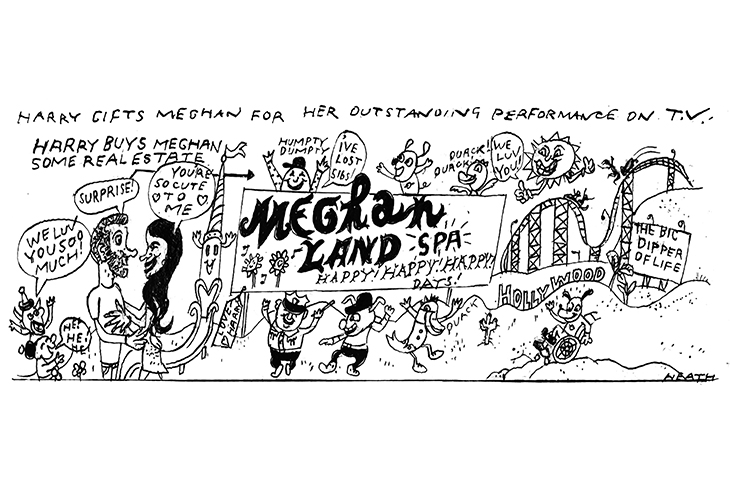Home
The world was agog, some in tears, some in synchronised toe-curling, as the Duchess of Sussex and her husband shared their sufferings with Oprah Winfrey. In America 17 million watched; in Britain 11 million. The Duchess spoke of Disney’s Little Mermaid; seeing it, she had exclaimed: ‘Oh my God she falls in love with the prince and because of that she loses her voice.’ She said that three days before her wedding at Windsor, she had been married ‘in our backyard’, with just three of them, including the Archbishop of Canterbury. She said she had considered suicide and that the royal family had taken her passport, keys and driving licence. She said there had been ‘concerns and conversations about how dark his [her son Archie’s] skin might be when he’s born’; Ms Winfrey later said the remark was not made by the Queen or Duke of Edinburgh. Buckingham Palace said: ‘The issues raised, particularly that of race, are concerning. While some recollections may vary, they are taken very seriously and will be addressed by the family privately.’ Piers Morgan left ITV’s Good Morning Britain after 41,015 complaints were made about his saying: ‘I don’t believe a word she said, Meghan Markle.’
Children returned to school. Secondary pupils were to be tested for coronavirus three times in a fortnight and then at home. First-dose vaccinations totalled 21,796,278 by the beginning of the week, more than 40 per cent of the adult population. The Foreign Secretary summoned a representative of the EU after Charles Michel, the President of the European Council, wrongly claimed that Britain had an ‘outright ban’ on exports of vaccines. At dawn on 7 March, total UK deaths (within 28 days of testing positive for coronavirus) stood at 124,419, including 1,542 in the past week, down by 34.1 per cent on the week before. Nightingale hospitals, set up since April, would close. BP told office staff to work from home for two days a week even after the end of restrictions. The government recommended a pay rise of 1 per cent for nurses and other NHS workers; Sir Simon Stevens, the head of NHS England, said that before the pandemic a 2.1 per cent rise had been assumed. The Duke of Edinburgh, 99, returned to King Edward VII’s hospital after a heart procedure at St Bartholomew’s Hospital.
Lord Frost, the minister responsible for relations with the EU, said that the UK extension of a grace period on border checks between Britain and Northern Ireland was legal. Greensill Capital went into administration; it had been the financial backer of Sanjeev Gupta, whose Liberty Steel owns 12 plants in Britain. Deliveroo said it would launch on the London Stock Exchange.
Abroad
The total in the world who had died with coronavirus reached 2,601,476 by the beginning of the week. In deaths per million, the Czech Republic, with 2,025, overtook Belgium, with 1,913. Brazil, with 1,238 deaths per million, remained behind the United States, with 1,616 per million. Fully vaccinated Americans were told they might meet indoors. The US Senate approved a $1,900 billion coronavirus relief package, with $1,400 to be sent to most Americans. US unemployment fell to 6.2 per cent. President Joe Biden’s Alsatian dogs were removed from the White House after one, Major, bit a security agent.
During his visit to Iraq, Pope Francis, aged 84, met Grand Ayatollah Ali al-Sistani, 90, the Shia leader. He went to Ur, Abraham’s birthplace, and prayed in the rebuilt church of the Immaculate Conception in Qaraqosh. Nazanin Zaghari-Ratcliffe, the British-Iranian woman jailed in Iran on spying charges, had her ankle tag removed at the end of her five-year sentence, but was told of a new court case against her scheduled for Sunday.
In Beijing, the 3,000-strong National People’s Congress approved plans to restrict to ‘patriots’ candidacy for election to Hong Kong’s Legislative Council. Microsoft blamed China for a hack on its servers to steal information from infectious disease researchers, universities and defence contractors. In Myanmar, U Khin Maung Latt, an official from the party of Aung San Suu Kyi, died in custody after being arrested at his home. In demonstrations against the coup of 1 February, 38 people were killed on one day. The European parliament voted to remove the immunity of Carles Puigdemont, the Catalan nationalist whom Spain wants to extradite from Belgium. Switzerland voted by 51 per cent to 49 for a ban on face-coverings in public, including the niqab. CSH






Comments